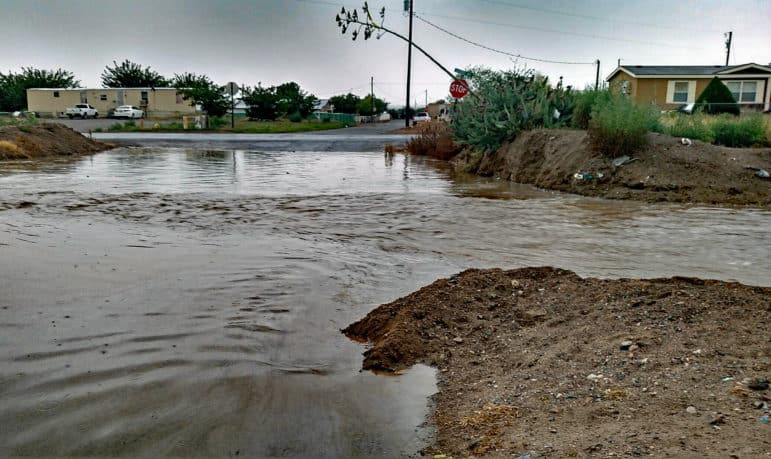
Courtesy photo
Heavy rains caused flooding in the northern Doña Ana County community of Salem this summer. Residents of communities like Salem will have three chances to share their infrastructure needs at upcoming meetings.
Residents of Doña Ana County concerned about conditions in dozens of underdeveloped communities called colonias have a new opportunity to speak out and participate in planned improvements at three upcoming meetings.
The public events grow out of an Oct. 11 resolution passed by the Board of County Commissioners that reaffirmed a commitment to the county’s 2003 Model Colonias Initiative, a project designed to overhaul the rural and semi-rural communities scattered across the county.
Calling for a reigniting of the colonia reform effort and recommending a blue print plan, the resolution recognizes the importance of collaborating with the New Mexico state government and other partners in a common goal to “galvanize small communities and dramatically improve the quality of life while concurrently stimulating economic development.”
Hosting 37 of 150 identified colonias in New Mexico, Doña Ana County has “far more than any other county and there are real needs to each of them,” said Jess Williams, Doña Ana County public information officer. A September 2017 county report estimated that slightly half of the county’s 209,000 residents live in colonias and surrounding rural areas.
The report calculated that $606 million is currently needed for local colonia improvements. The project costs pinpointed so far include dam repair and upgrade, new drainage, public facilities, county roads, wastewater systems and professional services.
Attended by county commissioners and their staff, the current round of public meetings is for the purpose of hearing out the specific needs of colonia residents as well as exploring possible funding solutions from lawmakers and the governor as the 2018 state legislative session approaches, according to Williams.
“Commissioners want to get out in the communities and take what (residents) know we need,” Williams said. Traditionally, colonia residents have attended a special Las Cruces Day during the legislative session in Santa Fe, he added.
The Oct. 11 Board of County Commissioners’ resolution instructed county management to designate a point person, the operations assistant county manager, to be responsible for managing and accounting future colonias development funding; keeping projects on track in a “timely and effective manner;” serving as the to-go person for affected residents; and acting as a “champion” for the betterment of colonias.
All five county commissioners — Isabella Solis, John Vasquez, Billy Garrett, Benjamin Rawson and Ramon Gonzalez — voted in favor of the resolution.
“I’m so excited they’re refocusing on colonias. I think it is timely,” said Guillermina Núñez-Mchiri, director of women’s and gender studies and a professor in anthropology at the University of Texas-El Paso, which is located next door to Doña Ana County. “They’re still in dire need of attention.”
A longtime researcher of southern New Mexico colonias, Núñez-Mchiri recalled comments more than a dozen years ago that the U.S. was a “nation at war” and that “nobody” cared about the problems of colonias.
In 2017, the U.S. is still a “nation at war” but it’s time to address domestic issues like the colonias, recognize the existence and needs of communities in the public policy shadows, work with partners to uplift a region with economic, cultural and family ties crossing state lines and international boundaries, and give hope to the youth, Núñez-Mchiri said.
The first public meeting on the renewed colonias initiative was held Nov. 15 in Vado-Del Cerro, a community historically tied to agriculture and dairy production which is located astride Interstate 10 between Las Cruces and El Paso.
The remaining meetings, all starting at 6 p.m. and scheduled to last about an hour, include events at the Hatch Community Center on Monday, Nov. 27; at the Delores Wright Center in Chaparral on Wednesday, Nov. 29; and at the Butterfield Community Center in far east Las Cruces on Wednesday, Dec. 6.
According to an official announcement from Doña Ana County, the meeting agendas will include a historical perspective on the Doña Ana County colonias initiative, an overview of the entire project, the schedule of upcoming meetings, and public discussion on the next steps to engage and lobby legislators for state funding. Translation and interpretation services will be available.
For additional information, those interested can contact Liz Reed in the Doña Ana County Community and Constituent Services Office at (575) 525-5959.
Kent Paterson is an independent journalist who covers issues in the U.S./Mexico border region.
